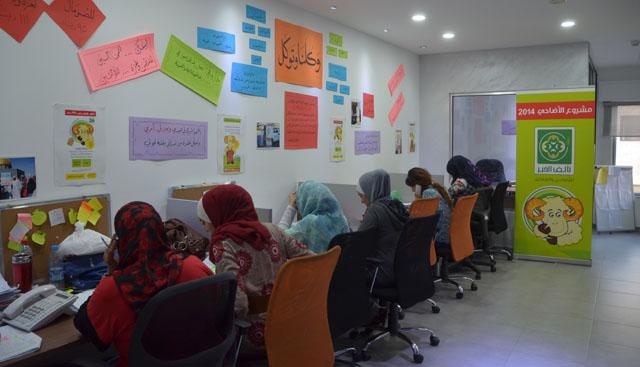You are here
‘More Jordanians sacrificing sheep for Eid through third parties’
By Muath Freij , Dana Al Emam - Oct 02,2014 - Last updated at Oct 02,2014

AMMAN — Instead of driving all the way to a stockyard near Amman to choose a sheep and have it sacrificed for Eid Al Adha, Nadira Ahmad just made a phone call to a specialised company that will do it for her.
“The employees are very nice and polite. They even visited me at the house to brief me on the whole process,” she told The Jordan Times over the phone on Thursday.
The feast of the sacrifice marks the end of the pilgrimage season, when Muslims of sufficient means are required to sacrifice livestock in remembrance of Prophet Ibrahim’s willingness to sacrifice his son Ismail to God.
For those like Ahmad who are unable to go to stockyards to buy sheep, many companies, unions and charitable societies now offer the service of sacrificing for Eid Al Adha at affordable prices, with their advertisements adorning street corners in the days leading up to the feast.
Ehab Deeb is the general manager of one such company, Taalof Al Khair.
“Our employees contact people or customers contact us to ask us to sacrifice for them,” he told The Jordan Times in an interview at his office in west Amman.
Most companies and societies, including Taalof Al Khair, provide a range of affordable prices from JD77to JD111, which is cheaper than the local market.
Most Jordanians find imported sheep more affordable, as they cost between JD125 and JD170 depending on their weight, while local sheep cost up to JD300, according to Zaidan Mohammad, the owner of a sheep stockyard in north Amman.
Mohammad said this year’s Eid Al Adha season is “much better” than last year and most of the 250 sheep in his stockyard have been marked sold and will be slaughtered in the stockyard on the first day of Eid.
Deeb said companies and societies like Taalof Al Khair offer lower prices because they deal directly with traders in countries that sell sheep at affordable prices.
Badi Rafaea, head of the Jordan Engineers Association’s social responsibility fund, said the association’s team goes to Australia to slaughter sheep there and then transport the meat to Jordan.
Sheep seller Ahmad Ayyash said local sheep are costly because the merchant pays for transportation and fodder, noting that prices this year are similar to those last year.
He estimated the number of imported sheep for the sacrifice season at 450,000, adding that local sheep are in high demand in Arab Gulf markets.
An employee at the Sheikh Noah Society said workers slaughter sheep in Australia under the supervision of a representative of the society to make sure that everything is Halal.
“The sacrificed sheep allocated to Jordan are distributed to those in need all year long, while sacrifices for Gaza are sent to beneficiaries in coordination with the Jordan Hashemite Charity Organisation,” added the employee, who spoke on condition of anonymity.
Deeb noted that in the beginning people were reluctant to sacrifice sheep through a third party, but gradually the number of clients has increased.
“They can distribute the meat themselves to a specific family, or we can do that. This builds trust between us and our customers,” he said, adding that the public are also offered options.
“For example, we have cattle and sheep which gives the client a wide range of prices. Also, more than one customer can share the price of one head of cattle as Sunna permits seven people can share it,” Deeb added.
The Sheikh Noah Society employee said staff members select beneficiaries after studying their social and economic conditions, adding that over 20,000 families across the country benefit from the meat distributed by the society.
By Thursday morning, over 4,000 clients had deputised the society to sacrifice on their behalf and distribute the meat to the poor.
Deeb said Taalof Al Khair enables customers to pay online or at one of the company’s booths located in malls, or even to a company employee who makes a house visit.
Taalof Al Khair was founded in 2009 as a private company to support charitable societies in Jordan with the distribution of sacrifices.
It currently supports 51 societies that serve around 20,000 underprivileged families.
“Last year, more than 32,000 families benefited from our service,” Deeb added.
He said sacrifice is becoming an important part of Jordanian culture.
“Everyone wants to sacrifice to celebrate Eid.”
Related Articles
The Greater Amman Municipality (GAM) on Monday closed down 12 illegal stockyards in the capital.
AMMAN — Industry, Trade and Supply Minister Maha Ali has met with importers and traders of livestock, whose merchandise is hihghly demanded
AMMAN — Butchers and sheep pen owners on the fourth day of Eid Al Adha complained of lack of demand for sheep this year compared to previous
















